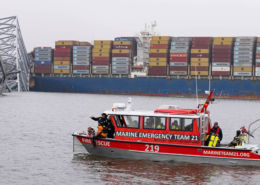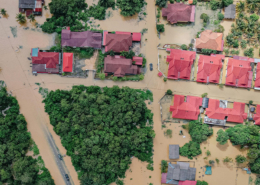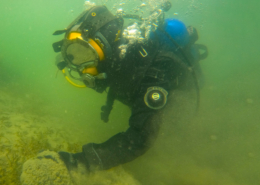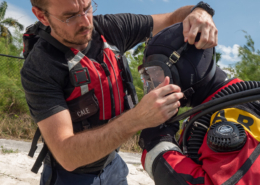Questions to Ask Yourself When Arriving on Scene
The world of public safety is one filled with good intentions. Most people choose to become public servants to help their communities, follow family traditions, or even to be a part of something that society has imbued with some level of honor. It feels good to know that you can help others, save the day, or bring closure to those who are hurting. The problem with this point of view is that it often leads men and women to rush into a situation to provide assistance. In reality, quick action is not always the best action.
Throughout the United States, public safety dive teams get calls on a regular basis to search for evidence, missing items, and even victims of crimes or accidents. In each of these cases, the dive team is often dispatched because it is the only group available that can do the job. In some cases, the evidence the team may find is the critical item that could put a bad person in jail. In other cases, mourning families yearn to know what really happened to a loved one. To get some of these answers, someone has to strap on the gear and go where others cannot.
When a dive team arrives on scene, the only time hasty action is critical is if a human life is in active jeopardy. Otherwise, time is on the side of the team. This factor suggests that a dive team can take the time to plan the steps needed to accomplish a mission. The first action any team must take when arriving at an operational location is to “size up” the scene and run through a series of sensible operational questions.
What hazards are obviously apparent?
When you arrive on any scene, take a moment to look around. Make sure you do not deploy any of your personnel or equipment into an unsafe area. The ERD 1 program teaches that divers should look for any apparent problems. Are there any downed power lines? Is the ground secure? Is there a safe place to stage equipment? What are the weather conditions and are they safe for dive operations? There is no sense in starting an operation only to have to cease activity or move when obvious issues could have been seen on arrival.
What entry points are available and sensible?
Your divers need to be able to enter the water, and maintain a secure connection with their tenders. For this reason, you need to make sure that any possible entry points are safe. Is there a safe way to enter the water? Do you need to rig any type of safety equipment to ensure safe entries? Can your tenders operate without hindrance? Can your tenders be anchored if necessary? Lastly, is our entry point near our search area? Using a remote entry point only makes sense in a time of necessity. Hauling a tow cable through the water or swimming long distances to a search location can tire your divers and lead to a possible rescue scenario. Recovery operations do not take precedence over human life. Before any diver enters the water, you need to make sure that you are not putting your own people in jeopardy.
Are any locals available who know of any potential dangers or hazards?
If you do not know a dive site, find someone in the area who does. Locals often know about area hazards, dangers, or problems. Often times at scenes we see bystanders or witnesses. These people were already in the area and already possess some level of site knowledge. They may be able to provide insight into factors you may otherwise not see right away. This information can then be factored into operational planning.
Does anyone know the water quality associated with the dive site?
Many states work to monitor water quality in most major bodies of water. This process often allows for water samples to be sent in for testing at little or no expense. This is an action that a dive team may take in regard to any body of water in its area of operations. If you know the quality of water you are entering, you can better determine the level of safety required for your divers. If you do not know the quality of water, or do not have current information, you must assume that any operational body of water might be contaminated. Similarly, why is the team on scene? If a truck carrying chemicals or materials such as fertilizers has been wrecked and submerged, the water must be viewed as contaminated. Recognition of these factors can only help protect your divers as you plan for operational tasks.
Is there any obvious flow?
Flow and current can create obvious problems for dive team operations. Dive teams must check to see if any flow or current is present. If there is water movement, the team must determine if the flow is too high for safe operations, or if the divers and equipment present are safe for operations in moving water. This is a situation in which technical ropes and rigging training may be essential to perform safe operations.
Do we need any special equipment?
Lastly, teams must determine if any special equipment is needed to perform an operation. If a body might be recovered, a body bag is needed. If the search area is extensive, remotely operated vehicles or sonar systems may be essential for running concise patterns. If a missing item is ferrous, metal detectors may be helpful. There are many special equipment items that can help a dive team perform safe and proper search operations. If special equipment is needed, take the time to call for it and plan to use this equipment in a manner that best performs the job while keeping divers as safe as possible.
This is just a basic list of questions. The most critical factor associated with dive team operations is safety. All efforts must be made to recognize, prevent, and overcome issues that could harm a diver or team member. If a scene is too unsafe, a team must also have the fortitude to say no to the dive. Any time you arrive on a scene, take a moment to look around, recognize any good or bad aspects related to the area in front of you, and move forward with a proper plan to best use the resources available.


 Photo By: Defense Visual Information Distribution Service
Photo By: Defense Visual Information Distribution Service


 Y. ZIN
Y. ZIN


It makes sense to consider the type of special equipment you might need for a crime scene and how to use it in an effective and safe manner. In my opinion, it would also be smart to consider what outside experts may be beneficial in the investigation. For example, I think that a professional forensic consultant could be very helpful in most crime scenes.